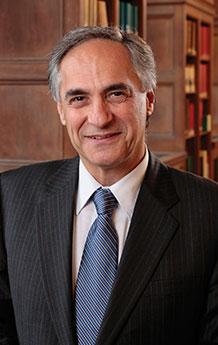Remarks from Robert J. Zimmer
 Good afternoon,
Good afternoon,
I am Bob Zimmer, president of the University of Chicago, and I welcome you to this event celebrating the extraordinary life of Dr. Joseph Kirsner. Many people here today knew Joe longer and more deeply than I did. I know you will hear from them of his extraordinary qualities as a person, as a physician, as a scientist, teacher, and mentor. But I wanted to begin this afternoon with some comments about Joe’s position within the community of the University of Chicago, where he played such an important and exemplary role.
I first came to the University of Chicago as a junior faculty member in mathematics in 1977. This was one year after Joe had stepped down from his role as chief of staff and deputy dean for clinical affairs in the medical school. One of the things I felt very quickly about the University was its sense of unity even in its complexity, and so I heard many things. Then, as now, talking about the medical school and its complications and stresses, its strengths and challenges, was one of the favorite Hyde Park pastimes. At that time one person I kept hearing about was Joe Kirsner – because he was seen as a pillar of what the medical school was supposed to be, what it aspired to be – someone who had clarity and vision of what we should be about. It was not until many years later that I actually met Joe and of course it was very easy to see immediately why he was such a legend.
There are many wonderful people at the University of Chicago and many people important to the history of the University over its 120 years. But there are some people who come to define the University – whose commitment to quality, to people, and to ideas are so powerful that they become for so many of us a definition of what we should all be aspiring to. Joe Kirsner was one of the few who come to define the University in this way. Joe came to the University in 1935, so his connection spanned 77 years, just short of two thirds of the University’s entire history. Over that time, he became a leader in every aspect of what we strive to be about – scientific research, compassionate clinical care, teaching and mentoring, building a community that is greater than any individual within it. While doing any one of these things well is hard enough, Joe excelled at all of them, and was able to be so powerful in achievement and commitment, that he could continuously see through situations and behavior to advocate not just for balancing all these activities, but for excelling at all of them. He never let us forget who we were and what we were striving to be.
In 1979, President Hanna Gray captured some of this in a letter to Joe which said in part: “The University and its medical center are enormously indebted to you. I am personally most grateful for your many contributions over time, through your research and treatment of patients, but most of all through your vision of the University and its role”
During recent years, the chances I had to talk to Joe were about the importance of compassionate medical care and that we should never forget its importance. With all the scientific advances, technological changes, economic pressures, changes in government policy and reimbursement arrangements, and evolution of the very structure of medical practices, Joe kept reminding us that in medicine we are ultimately taking care of people. In one of his annual holiday cards, Joe quoted Dr. William Osler, the first head of the physicians at Johns Hopkins Hospital: “Medicine is an art, not a trade; a calling not a business; a calling in which the heart will be ever exercised equally with the head.”
Joe was one the rare people who inspired everyone with his compassion and his intellect. He has left a lasting impression on the University of Chicago, the Pritzker School, and the Medical Center. And this extraordinary legacy will continue to be felt for many years to come.

